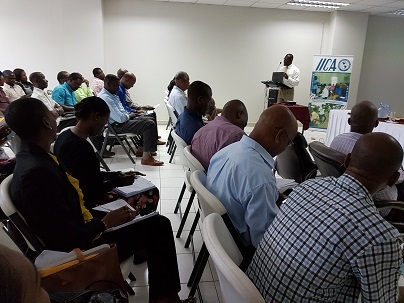The organization also promoted production strengthening and food trade.
St. George’s, Grenada, 25 March 2019 (IICA) – Actions to drive technology transfer and the adoption of good health, trade, and production practices were some of the main features of the work undertaken by the Inter-American Institute for Cooperation on Agriculture (IICA) in Grenada in 2018.
IICA’s work during this period focused on obtaining at least 10 results, mainly in the meat and citrus chains, as well as on boosting technical capacities in the Ministry of Agriculture and Lands.
During an IICA accountability seminar, Minister Yolande Bain-Horsford observed that, “For almost two decades, our strategic partnership with IICA has provided us with technical and material inputs for the benefit of the staff of the Ministry, farmers, agroprocessors and beekeepers, and in turn improved the skills and capacities of the sector, while enhancing the socioeconomic development of the nation.”
The event was attended by officers from the ministries of Agriculture and Lands and of Foreign Affairs; agroprocessors; farmers; as well as NGO and media representatives, who were included in the planning of some of the cooperation actions for the year.
Derek Charles, National Specialist in the IICA Grenada Office, emphasized that, “Involving actors from the agrifood sector in these processes was key to creating a sense of belonging and guaranteeing success. The accountability exercise helps to inspire confidence and respect between loyal partners, such as the Ministry and IICA.”
“I would like to congratulate IICA for its achievements in 2018,” said Morain, “and to ask that we continue working together to improve the agrifood sector. I employ an open door policy and am always willing to entertain suggestions on how to enrich the sector.”
Projects such as the adoption of a methodology for control point risk analysis at the Mirabeau meat processing plant—the largest in the country—doubled the processing capacity of the plant, increased controls for the prevention of sanitary, phytosanitary and occupational health risks, and also improved quality standards in the Grenadian meat industry.
In response to a request by the Ministry of Agriculture and Lands, IICA collaborated with the Ministry’s Pest Management Unit to prepare an action plan to assist farmers, suppliers, sellers, agronomists, quarantine officers, and agricultural extension staff, to assess the condition of citrus farms and to develop strategies to combat citrus greening (HLB), a disease that is attacking citrus production worldwide.
Plans for 2019 include operational strengthening at the Mirabeau slaughterhouse and in producer organizations, as well as public and private sector collaboration on agricultural health- and food safety-related matters.
More information:
Derek Charles, National Specialist, IICA Grenada












